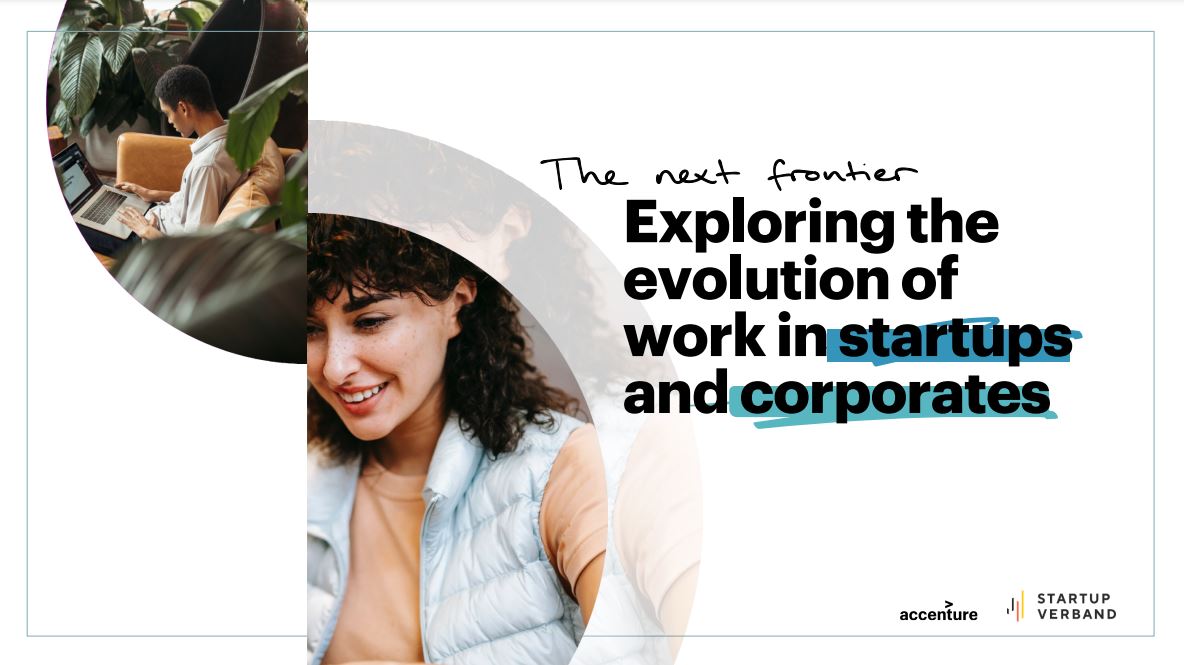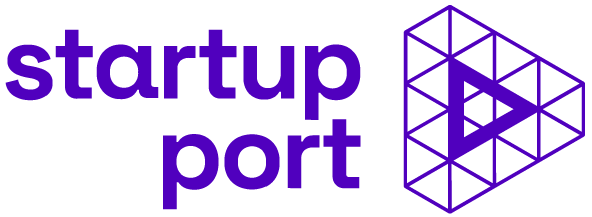The world of work is currently undergoing a comprehensive transformation process shaped by technological developments, demographic changes and, in particular, the Corona pandemic. In the study “The Next Frontier: Exploring the Evolution of Work in Startups and Corporates”, the Startup Association and the consulting firm Accenture examine these changes and focus on the innovation ecosystem in Germany. The question will be asked how start-ups and established companies are shaping the future of work and what they can learn from each other.
The most important results at a glance:
- Attracting young talent: Start-up employees are on average significantly younger than employees in Germany and 86 percent have a university degree.
- High job satisfaction: At 32 percent, employees in start-ups are more often very satisfied with their work than employees in established companies.
- Focus on new forms of work: Flexibility (86 per cent) takes centre stage as a motivating factor and is clearly more important than income (65 per cent) and security (41 per cent).
Start-ups attract young talent – companies push cooperation with scene
With an average age of 32, employees in start-ups are significantly younger than the workforce in Germany as a whole, which has an average age of 43. Another characteristic feature is the enormously high proportion of employees with an academic degree (86 per cent), compared to only 24 per cent of the workforce as a whole. Established companies have recognised this attraction for young talent and increasingly see the strategic importance of so-called innovation ecosystem units that work closely with start-ups.
Flexibility, steep learning curve and purpose – this is how New Work motivates people
The attractiveness of start-ups for young talent is also reflected in job satisfaction: 32 percent are very satisfied with their work, compared to 22 percent in the established economy. In the start-up industry, it is above all new work aspects that act as motivating factors: Flexibility, self-fulfilment and purpose. For 84 percent of start-up employees, it is important to constantly learn new things and 83 percent want to see the relevance of their work. The otherwise dominant factors of income (65 percent) and security (41 percent) play a subordinate role in comparison. Corporate Innovation Ecosystem Units embrace many of these New Work aspects. Networking and cooperation beyond one’s own company is very central to everyday work here.
New Work is a central corporate strategy – community spirit forms the basis
Start-up founders are aware of the interests and motives of their employees: When asked about the strategic relevance in the “war for talents”, 73 percent consider New Work to be crucial, while only 45 percent rate income as decisive. The most important basis of the work culture in start-ups is the sense of community: 68 percent of employees describe the company structure as non-hierarchical or hardly hierarchical and 84 percent say they know the names of all their colleagues. Innovation Ecosystem Units use the cooperation with start-ups specifically to renew their work culture with regard to New Work. With regard to the topic of community, many “micro-communities” are formed here due to the large number of employees – along projects, interests or work locations.
Growth poses challenges for work culture – clear values become more important
The phase of rapid growth typical for start-ups poses enormous challenges for the work culture. Fewer and fewer employees know all their colleagues personally and clearer structures are being introduced: While start-ups with fewer than 50 employees are described as hierarchical by only 27 percent, the figure rises to 47 percent for larger companies. This also brings with it new demands on leadership – especially in the areas of trust and decision-making competence, difficulties are emerging. In the transition to larger and thus more structured organisations, firm values and a shared vision that are more clearly established in the business sector become increasingly important.
The innovation ecosystem has become more professional – Learnings from the corporate world
The cooperation between established companies and start-ups has gained enormously in importance in recent years and has become more professional in many respects. Innovation Ecosystem Units have developed processes and roles to moderate differences in work cultures, and the startup ecosystem has grown closer to the corporate world. Important starting points for the further development of cooperation and mutual learning lie in the areas of work-life balance and health: while 51 percent of start-up employees rate the flexibility of working hours very positively, only 26 percent do so for part-time offers and only 12 percent for stress and mental health.
Franziska Teubert (Managing Director Startup Association):
“With our study, we shed light on the buzzword New Work. We now know: Employees in start-ups are more satisfied than average with their work. The future of work is characterised by the desire for flexibility and purpose. In view of the shortage of skilled workers, work culture is becoming increasingly important and with New Work, start-ups have a clear advantage with young talent. However, in order to attract highly qualified talent even in the phase of rapid growth, we need the appropriate instruments in Germany – such as internationally competitive employee share ownership schemes. Currently, we are at the bottom of the league in terms of ESOP.
Sigrid Stinnes (Innovation Lead at Accenture for the German-speaking countries):
“The professionalisation of the cooperation between start-ups and corporates is proof of how important a functioning ecosystem has become for topics such as innovation and growth, even in traditional industries. At the same time, we see that the influence of ‘new work’ in combination with the right leadership qualities is still underestimated. This is something that companies need to address more if they want to retain young talent.”
The full report can be downloaded here.
About the report
The report highlights the current changes in the world of work with a focus on German start-ups as well as corporate innovation ecosystem units that push collaboration with start-ups in the established economy. The data basis is a comprehensive survey of more than 800 German start-up employees and founders as well as 15 interviews with innovation experts from large companies.
About the Startup Association
The Startup Association is the representative and voice of startups in Germany and represents their interests, positions and concerns vis-à-vis legislation, administration and the public. The association sees itself as a network of start-ups in Germany. Further information on the Startup Association is available at www.startupverband.de.
About Accenture
Accenture Plc (formerly Andersen Consulting), based in Dublin, Ireland, is one of the world’s largest management and strategy consulting, technology and outsourcing service providers.

